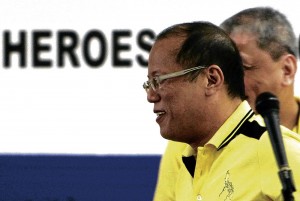
President Benigno Aquino. INQUIRER FILE PHOTO
MANILA—President Aquino has vetoed at least 55 flawed bills of local application, rebuffing some lawmakers who insisted on the approval of their pet bills despite their infirmities, a Palace official said Thursday.
The 55 local bills were vetoed because they sought to convert municipal, city and provincial roads into national roads although they merely interconnect barangay (villages), municipalities and cities within their areas, or merely serve the needs of local traffic, the head of the Presidential Legislative Liaison Office said.
Apart from lacking justification, the roads’ conversion would further strain the budget of the Department of Public Works and Highways, which maintains national roads, Manuel Mamba said.
A senator pushed for the passage of these bills as part of his commitment to congressional representatives despite being told that these would likely be vetoed by the President for failing to meet the criteria, Mamba said.
“They probably thought that the President was bluffing,’’ he said in an interview.
The President is very meticulous with legislative measures, from the time they’re filed until they are brought to his desk for si9gning into law, and proof of this is that he asks for inputs from the department concerned, Mamba said.
“He hates the idea of a bill lapsing into law; he really studies them before he signs them,’’ he said.
Mr. Aquino recently vetoed the proposed Centenarian Act offering incentives for the country’s estimated 7,000 centenarians, and the Rights of Internally Displaced Persons Act of 2013 protecting the rights of internal refugees, and last month, the proposed Magna Carta of the Poor, because of their inherent flaws.
The first offers a 75-percent discount on goods and services for the centenarians that, however, are not tax deductible for business owners. The second grants powers to the Commission on Human Rights that belong to the judiciary. The third requires a P3-trillion budget to be implemented.
Mr. Aquino, however, signed into law more than 20 bills converting local roads into national roads because they met the criteria.
The veto should serve as a lesson to all, said Mamba.
“This is a learning experience for everyone. There should be collaboration and engagement,’’ he said, pointing out that the lawmakers have the final say on the approval of a bill, regardless of the views of officials from the Executive Department. “This would improve legislation.’’
PLLO has 40 staff members who work in clusters, and liaise with lawmakers in the Senate and House of Representatives in monitoring the deliberations on 3,000 and 60,000 bills, respectively, at a given time, Mamba explained.
The PLLO’s point-men at the committee hearings are the department legislative liaison officers, who are rotated so often that they don’t gain enough expertise in handling certain bills. That’s why even Mr. Aquino wants secretaries or assistant secretaries to perform this role, he said.
And unless they relay their objections to a bill, the PLLO is at a loss, he said.
“Everyone is at fault here,’’ Mamba admitted, saying there should be aggressive collaboration of all parties.